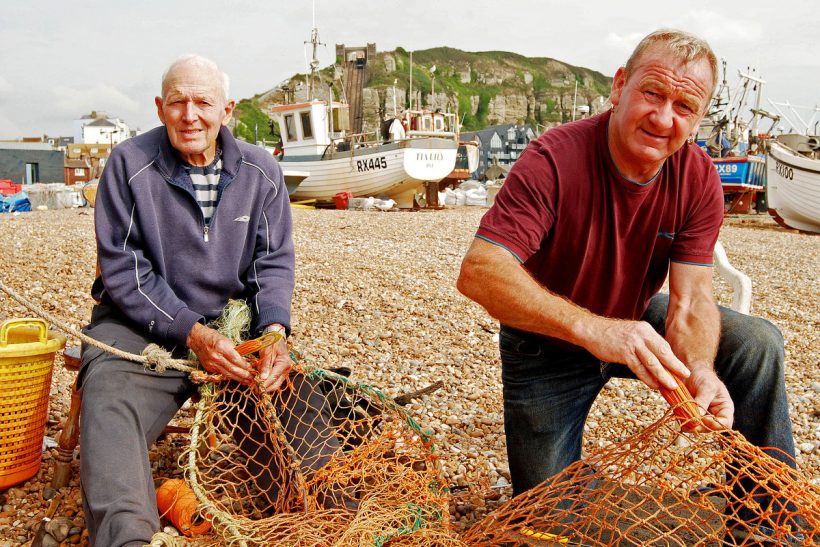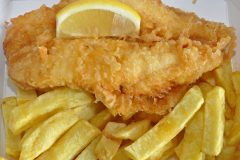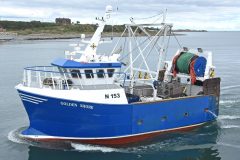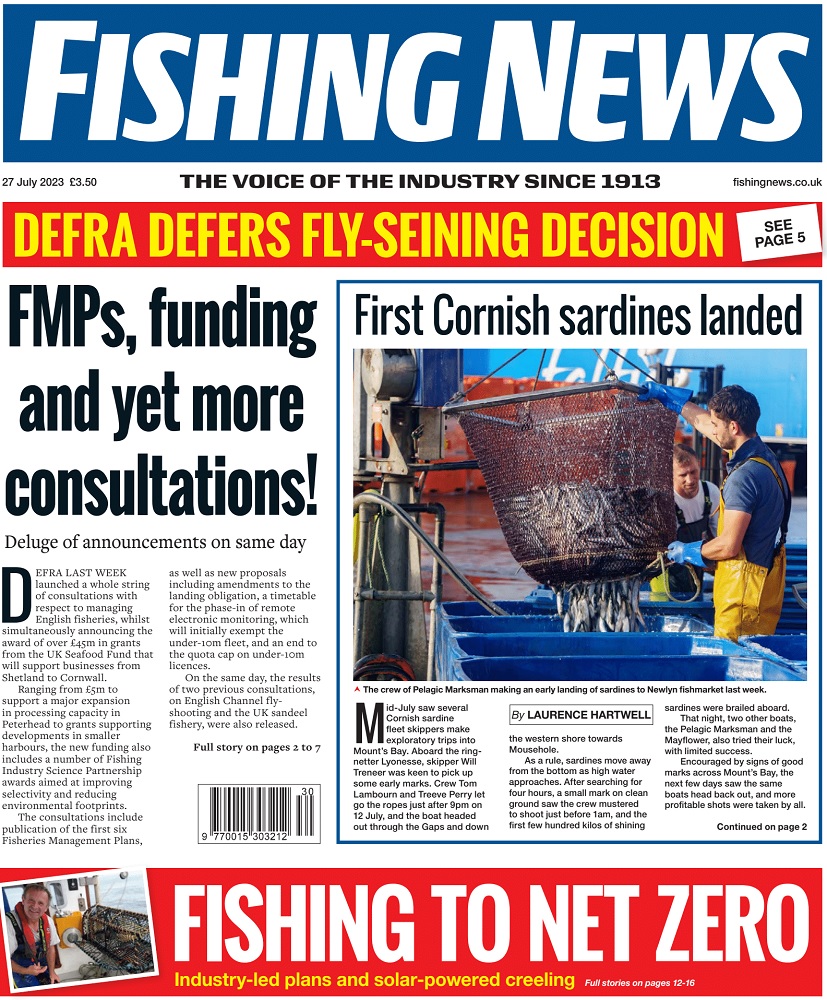Located on the south coast of Sussex, Hastings is home to the UK’s largest beach-launched fleet and fishing community, reports John Periam
Above: Stan Pepper and Robert Ball working on their nets at Hastings – this always attracts a lot of interest from the tourists.
The eastern end of Hastings is home to the much-photographed Old Town, where its shingle beach, known locally as The Stade (the Old Saxon term meaning ‘landing place’) is enduringly popular with tourists.
The beach has a steep shingle bank from where the 28 inshore fishing boats are launched and hauled out again (not an easy task), with the help of the many old rusty bulldozers and tractors that are parked between stacks of netting and pots. The Stade has a preservation order on it, and the Hastings fishery is endorsed by the Marine Stewardship Council, making it near-perfect.
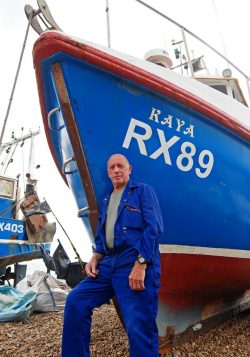
Paul Joy by his fishing boat Kaya – Paul manages to combine fishing with his work for the Hasting Fishermen’s Protection Society and the New Under Ten Fishermen’s Association.
Paul Joy is chairman of Hastings Fishermen’s Protection Society (HFPS) and co-chairman of the New Under Ten Fishermen’s Association (NUTFA). He started fishing 44 years ago, following a long family tradition dating back to the Domesday Book. He has his office close to the beach, and when not at sea is actively at work on behalf of NUTFA and the Hastings Society. “My job is now a 24-hour task to see what I can do to improve the conditions for our UK inshore fishing fleets. I will be the first to admit that, at times, it has not been an easy ride, with many bridges to cross. I have now learnt to try to slow down and take each day as it comes.”
Hastings is a traditional mixed fishery, and the fishermen are selective in the methods they use to catch fish. The HFPS office is run on a daily basis by Yasmin Ornsby, and her husband Philip used to run the fisherman’s museum which is situated in one of 50 tall black wooden net sheds standing in rows built in 1834. They also run an education scheme, so that local schoolchildren are made aware of the environment and history of the town’s fishing industry.
This area is also popular when it comes to making films and television series, including the excellent Foyles War. “Fishermen make good extras,” said Paul, with a smile.
“Looking back, prior to us leaving the EU, when we went into Europe 82% of the fish pool was British, and we got 8% back in monetary value. The quota for cod in the Channel was 150t in area VIId last year, whereas for France it was 1,800t, of which 470t was left uncaught or dumped in the French sector.”
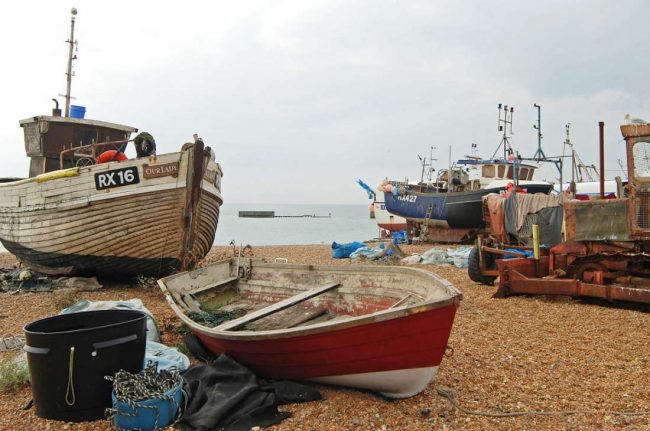
A typical scene at the Stade Hastings, where 28 inshore boats are launched and retrieved from the beach by bulldozers and tractors.
Paul Joy continued, “There has been a decimation of many of our coastal communities because of the lack of fishing opportunities, which was nothing to do with our fishing stocks. Our territorial rights were taken away from us limiting us to six miles instead of 12 miles. The French can fish six miles from us, but we are unable to do the same there. I have seen fishermen sell their boats and move away from some areas; their properties taken over as second homes for people who want to live by the sea.”
The referendum was an ideal opportunity for fishermen to vote with their feet and they did that under the Brexit banner. How does Paul Joy see the future now?
“We are lucky that we do have a supportive MP in Amber Rudd. She has taken our concerns on board and has worked hard on our behalf with the past and present fisheries ministers. This could improve now, as Amber has recently been appointed as the new Home Secretary. I know she supported staying in the EU, but this did not deter her when it came to helping us at Hastings.”
Local fisherman Dean Adams was keen to make sure that, with the Brexit vote, things will work. “As Nigel Farage said ‘Proof of the pudding is how we deal with the fishing industry’. I can’t agree more. Andrea Leadsom, the Environment Secretary, seems to have been very quiet since she took over her post. I am delighted to see that Amber Rudd is taking our case up.”
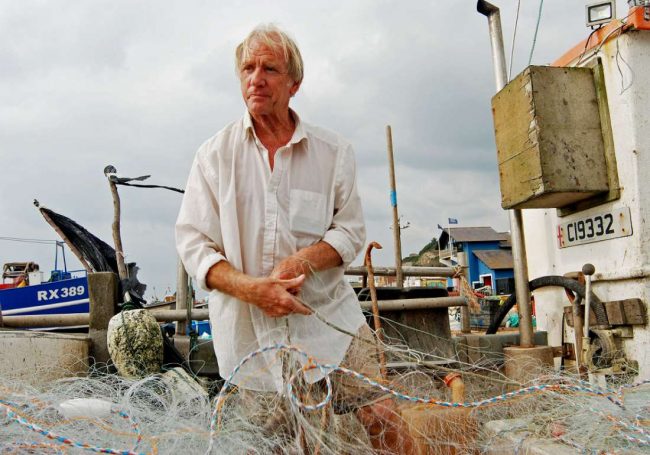
Douglas Joy on his boat preparing nets for fishing the next day – the beach is the fishermen’s workplace, as they do not have moorings or pontoons.
Robert Ball was busy mending his nets, along with Stan Pepper. Both are long-established and well-respected Hastings fishermen. “We have been made promises in the past. Our fishing goes back to Domesday and, frankly, I wonder if we were better off then. Before joining the EU we ran a very successful and sustainable fishery at Hastings. From then, it went downhill. We will see if the promises made do happen.”
The local Fisherman’s Association Club was busy, clearing up The Stade after the Hastings Seafood Festival, which attracted thousands of people over the weekend. “We have a mixture of angling boats and commercial boats working from Hastings. I know there are issues relating to how both parties work linked to catches relating to our quotas. We do try to work together here, and I will be the first to admit, at times, some of the fishermen have looked on with dismay when they have seen some of the catches that anglers have brought in. This is, of course, something that will have to be discussed when we plan our own sustainable working quotas,” said Paul Joy.
This was endorsed by Paul Joy’s brother, Douglas, who also fishes from the Stade. “It is our livelihood, and we both own our own boats. We know this part of the coast well and, along with others, can fish sustainably. Currently, the sea temperatures are keeping the fish out further, so we are low on our catches. I agree with Paul; if given the opportunity to manage our own areas we will be able to make Hastings a viable fishery again. Having the EU dictate to us, and seeing what they were able to get away with, was not an easy thing to wake up to each morning.”
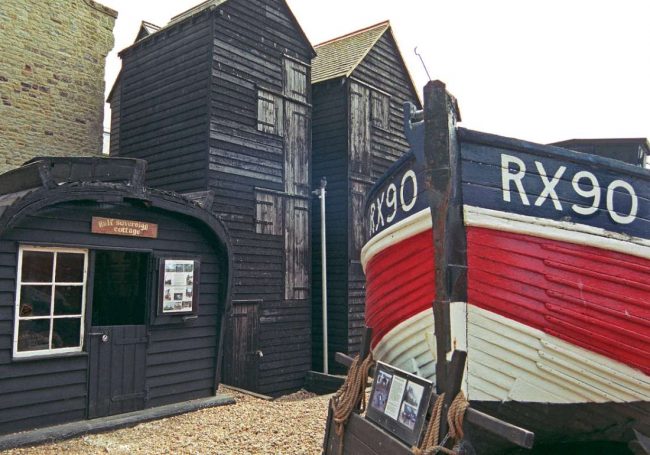
One of the 50 tall, black, wooden, net sheds by the Hastings Fishermen’s Museum, which were built in 1834.
Paul was very angry when it came to talking about the pulse fishing off the Thanet coast. “I really feel for Tom Brown and the fishermen there when I hear what the Dutch are doing. They are banned from doing it in their own waters so move it into the channel just off our six-mile limit. To put electric currents via cables into the sea to catch fish is a total no-go as far as I am concerned. It has got to be stopped, and we will fight all the way to do just that.”
It is surprising how large some of the vessels look when winched back onto the beach. Heath Fox, looking down by his net hauler on board RX 442, made his views,loud and clear. “Paul does a lot for us, and we do work together – of course, we will, at times, have different opinions. I’ve seen things happen on this beach that surprise me to this day. There is nothing worse than having to discard fish just off shore, while other EU members keep theirs. We need our own quotas now.”
Returning from the beach to Paul’s office, it was a delight to see how many people he knows. Questions relating to the industry were mixed with those about being able to store some fish while a freezer was being repaired. The local fish market was very quiet – catches are currently low due to the sea temperatures, as mentioned earlier.
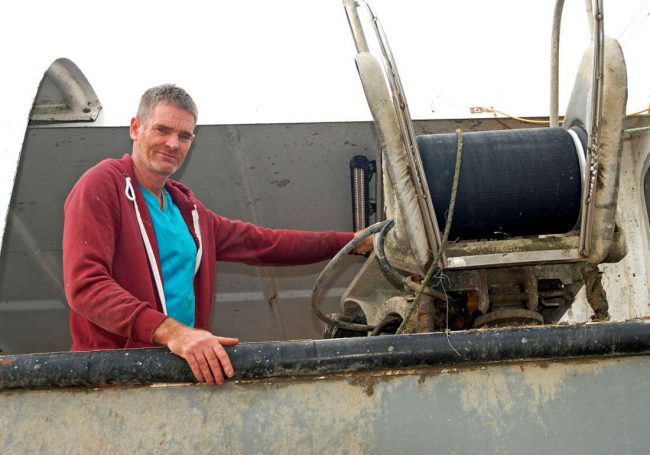
A smile from Heath Fox by his hauler on RX 442. Like most Hastings fishermen, Heath supports the HFP Society and its future.
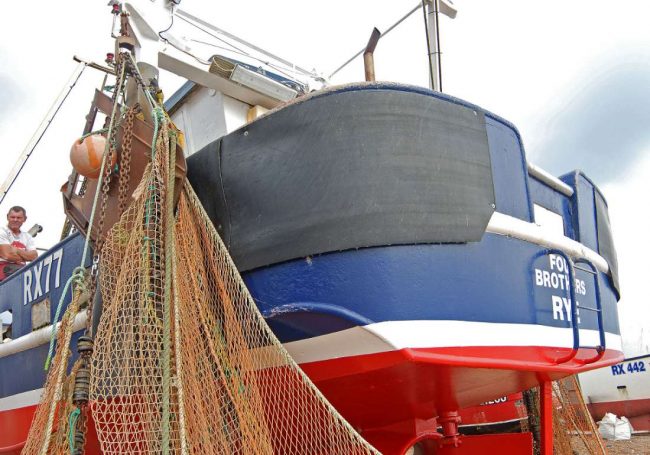
Dean Adams on his fishing boat Four Brothers: “The proof of the pudding is how we deal with the fishing industry now – that’s important to me.”
“We can’t survive on the quotas that we currently have, including skate at 70kg a month. This is unrealistically low and, therefore, unviable quotas will continue to be a major problem unless we invest in the situation ourselves,” said Paul.
What do you want to see happen now we are out of the EU, asked Fishing News? “Territorial limits are top of the list. We should divide Area 7D in two, and the same with the rest of the UK. These are our territorial waters and, rightly, we should have them back. It will take a while as there are other issues to consider. Coastal areas make up 76% of the UK and we need to protect the fishing communities.
“The current quota is all in the hands of Producer Organisations, which I believe is about 99%. One key factor that we have got to try to address is to form our own Coastal Producers’ Organisation so that we can take control of our own element quota management. To have our own PO is a step towards self-sufficiency – we look at a PO as a vessel to hold and take quota. This will hopefully address the balance between the over-10 and under-10 fisheries. A PO should be run by fishermen for fishermen to manage the fishery – not for shareholders.”
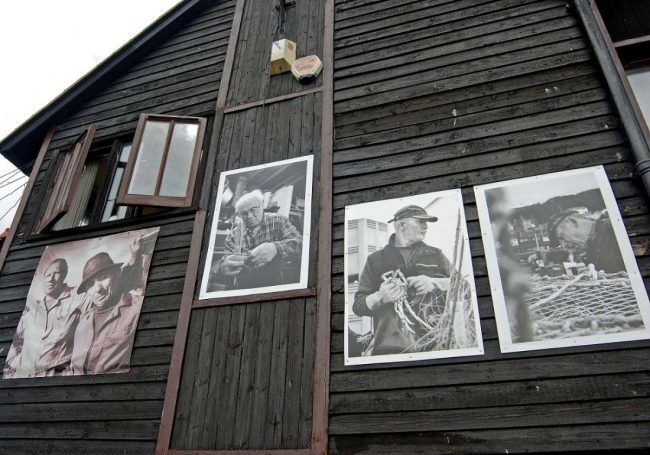
A recent photographic exhibition of John Cole’s work, featuring local fishermen at work, was held during the Seafood Festival.
Paul went on to say, “It is a case of how quickly we can deal with the current issues that have left us in this position. If we can start having new territorial waters introduced, we can debate where we can go from there. Yes, quotas will be needed, and fish protected; but we will manage them, and if we have one, let it be a fair one for us, and not for an individual to make money from, as it is currently happening.
“Fishermen at Hastings fish four main species – cod, skate, sole and plaice. Without these four quotas at a sensible level, what are they going to do? We are bumping along the bottom. This year has been poor. The cuttlefish season was okay for those who fish them, and that helped us. The fish is there, but it has not migrated into the inshore waters. If we go out further, we have an influx of skate which we have to discard. Sadly, we do not have the opportunity to diversify that some other areas enjoy.”
“In conclusion, we do have the other organisations such as the IFCAs, DEFRA, and the NFFO. I would, however, like to look at the stance of the NFFO within Brexit, as they have a lot of foreign contingency members, and how will that fit in with Brexit? We also have the IFCAs and their new regulations to deal with, which will involve more expense for the average fisherman. The opportunity to get back what we have lost is there. We all have to work together to do just that.”
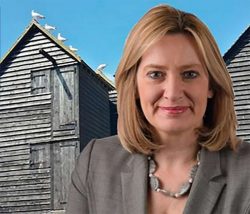 Amber Rudd
Amber Rudd
Speaking exclusively to Fishing News, the Home Secretary Amber Rudd said: “The fishing industry is an integral part of our communities in Hastings and Rye – it’s key to our economy, culture, heritage and identity.
“Over the coming weeks I will be arranging meetings with local fishermen and with the fisheries minister to discuss the future of the under-10m inshore fishing fleet following the UK’s vote to leave the EU, and what opportunities this may hold. Securing the best settlement possible for Hastings and Rye fishing fleets will continue to be a top priority for me as the local MP.”
Read more from Fishing News in our features section.


Located on the south coast of Sussex, Hastings is home to the UK’s largest beach-launched fleet and fishing community, reports John Periam Above: Stan Pepper and Robert Ball working on their nets at Hastings – this always attracts a lot of interest from the tourists. The eastern end of Hastings is home to the much-photographed Old Town, where its shingle beach, known locally as The Stade (the Old Saxon term meaning ‘landing place’) is enduringly popular with tourists. The beach has a steep shingle bank from where the 28 inshore fishing boats are launched and hauled out again (not an easy task), with the help of the many old rusty bulldozers and tractors that are parked between stacks of netting and pots. The Stade has a preservation order on it, and the Hastings fishery is endorsed by the Marine Stewardship Council, making it near-perfect.

Paul Joy by his fishing boat Kaya – Paul manages to combine fishing with his work for the Hasting Fishermen’s Protection Society and the New Under Ten Fishermen’s Association.
Paul Joy is chairman of Hastings Fishermen’s Protection Society (HFPS) and co-chairman of the New Under Ten Fishermen’s Association (NUTFA). He started fishing 44 years ago, following a long family tradition dating back to the Domesday Book. He has his office close to the beach, and when not at sea is actively at work on behalf of NUTFA and the Hastings Society. “My job is now a 24-hour task to see what I can do to improve the conditions for our UK inshore fishing fleets. I will be the first to admit that, at times, it has not been an easy ride, with many bridges to cross. I have now learnt to try to slow down and take each day as it comes.” Hastings is a traditional mixed fishery, and the fishermen are selective in the methods they use to catch fish. The HFPS office is run on a daily basis by Yasmin Ornsby, and her husband Philip used to run the fisherman’s museum which is situated in one of 50 tall black wooden net sheds standing in rows built in 1834. They also run an education scheme, so that local schoolchildren are made aware of the environment and history of the town’s fishing industry. This area is also popular when it comes to making films and television series, including the excellent Foyles War. “Fishermen make good extras,” said Paul, with a smile. “Looking back, prior to us leaving the EU, when we went into Europe 82% of the fish pool was British, and we got 8% back in monetary value. The quota for cod in the Channel was 150t in area VIId last year, whereas for France it was 1,800t, of which 470t was left uncaught or dumped in the French sector.”

A typical scene at the Stade Hastings, where 28 inshore boats are launched and retrieved from the beach by bulldozers and tractors.
Paul Joy continued, “There has been a decimation of many of our coastal communities because of the lack of fishing opportunities, which was nothing to do with our fishing stocks. Our territorial rights were taken away from us limiting us to six miles instead of 12 miles. The French can fish six miles from us, but we are unable to do the same there. I have seen fishermen sell their boats and move away from some areas; their properties taken over as second homes for people who want to live by the sea.” The referendum was an ideal opportunity for fishermen to vote with their feet and they did that under the Brexit banner. How does Paul Joy see the future now? “We are lucky that we do have a supportive MP in Amber Rudd. She has taken our concerns on board and has worked hard on our behalf with the past and present fisheries ministers. This could improve now, as Amber has recently been appointed as the new Home Secretary. I know she supported staying in the EU, but this did not deter her when it came to helping us at Hastings.” Local fisherman Dean Adams was keen to make sure that, with the Brexit vote, things will work. “As Nigel Farage said ‘Proof of the pudding is how we deal with the fishing industry’. I can’t agree more. Andrea Leadsom, the Environment Secretary, seems to have been very quiet since she took over her post. I am delighted to see that Amber Rudd is taking our case up.”

Douglas Joy on his boat preparing nets for fishing the next day – the beach is the fishermen’s workplace, as they do not have moorings or pontoons.
Robert Ball was busy mending his nets, along with Stan Pepper. Both are long-established and well-respected Hastings fishermen. “We have been made promises in the past. Our fishing goes back to Domesday and, frankly, I wonder if we were better off then. Before joining the EU we ran a very successful and sustainable fishery at Hastings. From then, it went downhill. We will see if the promises made do happen.” The local Fisherman’s Association Club was busy, clearing up The Stade after the Hastings Seafood Festival, which attracted thousands of people over the weekend. “We have a mixture of angling boats and commercial boats working from Hastings. I know there are issues relating to how both parties work linked to catches relating to our quotas. We do try to work together here, and I will be the first to admit, at times, some of the fishermen have looked on with dismay when they have seen some of the catches that anglers have brought in. This is, of course, something that will have to be discussed when we plan our own sustainable working quotas,” said Paul Joy. This was endorsed by Paul Joy’s brother, Douglas, who also fishes from the Stade. “It is our livelihood, and we both own our own boats. We know this part of the coast well and, along with others, can fish sustainably. Currently, the sea temperatures are keeping the fish out further, so we are low on our catches. I agree with Paul; if given the opportunity to manage our own areas we will be able to make Hastings a viable fishery again. Having the EU dictate to us, and seeing what they were able to get away with, was not an easy thing to wake up to each morning.”

One of the 50 tall, black, wooden, net sheds by the Hastings Fishermen’s Museum, which were built in 1834.
Paul was very angry when it came to talking about the pulse fishing off the Thanet coast. “I really feel for Tom Brown and the fishermen there when I hear what the Dutch are doing. They are banned from doing it in their own waters so move it into the channel just off our six-mile limit. To put electric currents via cables into the sea to catch fish is a total no-go as far as I am concerned. It has got to be stopped, and we will fight all the way to do just that.” It is surprising how large some of the vessels look when winched back onto the beach. Heath Fox, looking down by his net hauler on board RX 442, made his views,loud and clear. “Paul does a lot for us, and we do work together – of course, we will, at times, have different opinions. I’ve seen things happen on this beach that surprise me to this day. There is nothing worse than having to discard fish just off shore, while other EU members keep theirs. We need our own quotas now.” Returning from the beach to Paul’s office, it was a delight to see how many people he knows. Questions relating to the industry were mixed with those about being able to store some fish while a freezer was being repaired. The local fish market was very quiet – catches are currently low due to the sea temperatures, as mentioned earlier.

A smile from Heath Fox by his hauler on RX 442. Like most Hastings fishermen, Heath supports the HFP Society and its future.

Dean Adams on his fishing boat Four Brothers: “The proof of the pudding is how we deal with the fishing industry now – that’s important to me.”
“We can’t survive on the quotas that we currently have, including skate at 70kg a month. This is unrealistically low and, therefore, unviable quotas will continue to be a major problem unless we invest in the situation ourselves,” said Paul. What do you want to see happen now we are out of the EU, asked Fishing News? “Territorial limits are top of the list. We should divide Area 7D in two, and the same with the rest of the UK. These are our territorial waters and, rightly, we should have them back. It will take a while as there are other issues to consider. Coastal areas make up 76% of the UK and we need to protect the fishing communities. “The current quota is all in the hands of Producer Organisations, which I believe is about 99%. One key factor that we have got to try to address is to form our own Coastal Producers’ Organisation so that we can take control of our own element quota management. To have our own PO is a step towards self-sufficiency – we look at a PO as a vessel to hold and take quota. This will hopefully address the balance between the over-10 and under-10 fisheries. A PO should be run by fishermen for fishermen to manage the fishery – not for shareholders.”

A recent photographic exhibition of John Cole’s work, featuring local fishermen at work, was held during the Seafood Festival.
Paul went on to say, “It is a case of how quickly we can deal with the current issues that have left us in this position. If we can start having new territorial waters introduced, we can debate where we can go from there. Yes, quotas will be needed, and fish protected; but we will manage them, and if we have one, let it be a fair one for us, and not for an individual to make money from, as it is currently happening. “Fishermen at Hastings fish four main species – cod, skate, sole and plaice. Without these four quotas at a sensible level, what are they going to do? We are bumping along the bottom. This year has been poor. The cuttlefish season was okay for those who fish them, and that helped us. The fish is there, but it has not migrated into the inshore waters. If we go out further, we have an influx of skate which we have to discard. Sadly, we do not have the opportunity to diversify that some other areas enjoy.” “In conclusion, we do have the other organisations such as the IFCAs, DEFRA, and the NFFO. I would, however, like to look at the stance of the NFFO within Brexit, as they have a lot of foreign contingency members, and how will that fit in with Brexit? We also have the IFCAs and their new regulations to deal with, which will involve more expense for the average fisherman. The opportunity to get back what we have lost is there. We all have to work together to do just that.”  Amber Rudd Speaking exclusively to Fishing News, the Home Secretary Amber Rudd said: “The fishing industry is an integral part of our communities in Hastings and Rye – it’s key to our economy, culture, heritage and identity. “Over the coming weeks I will be arranging meetings with local fishermen and with the fisheries minister to discuss the future of the under-10m inshore fishing fleet following the UK’s vote to leave the EU, and what opportunities this may hold. Securing the best settlement possible for Hastings and Rye fishing fleets will continue to be a top priority for me as the local MP.” Read more from Fishing News in our features section.
Amber Rudd Speaking exclusively to Fishing News, the Home Secretary Amber Rudd said: “The fishing industry is an integral part of our communities in Hastings and Rye – it’s key to our economy, culture, heritage and identity. “Over the coming weeks I will be arranging meetings with local fishermen and with the fisheries minister to discuss the future of the under-10m inshore fishing fleet following the UK’s vote to leave the EU, and what opportunities this may hold. Securing the best settlement possible for Hastings and Rye fishing fleets will continue to be a top priority for me as the local MP.” Read more from Fishing News in our features section.

